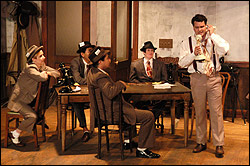![]() The Front Page
The Front Page
Capitol Hill Arts Center; ends Sat., Oct. 22
In an epilogue to its 1929 edition, journalist- turned-playwright Ben Hecht called The Front Page a “valentine thrown to the past,” written by “two reporters in exile” from the panic and press rooms that he and co-author Charles MacArthur so breathlessly and lovingly satirized. Annex director Ed Hawkins and crew, lobbing their own inky valentine at the bulldog days of yore, have opted to preserve the unbridled spirit of the original script, hewing to the foul-mouthed and racially risky verve of the 1928 production. What that means—besides an absolutely lovely set by Brad Cook that fairly bleeds with the sepia testosterone of Menckenesque reportage—is that this Front Page ensemble is in a man’s world: vulgar, jocular, violent, graspingly ambitious. Any sexual tension here is distinctly if mildly homoerotic, an ass-slapping sublimation of the personal politics of bylines and deadlines.
However, this production is no less romantic for removing the sweet-and-sour love struggle of Howard Hawks’ His Girl Friday, the masterful gender-switching 1940 film adaptation in which Rosalind Russell’s star reporter struggled to escape the charming clutches of overbearing editor Walter Burns (a never- better Cary Grant). If they don’t make movies like that anymore, neither do we see many plays like this—and the newspaper days it depicts are long gone as well. The appeal here rests largely in seeing the way things used to be.
Set in the press room of a Chicago court on the eve of the execution of radical leftist Earl Williams, the play embraces the controlled chaos of old-time journalists angling for a story, in all their unethical, conspiring, bigoted, sexist, and somehow exhilarating glory. By pulling no punches, and allowing the dialogue to flow with its full repertoire of racial epithets and chauvinistic banter, Hawkins captures the pure energy and embattled intelligence of what could be considered American newspapers’ greatest era. The hard-boiled language and raging political incorrectness of the press room is neither condoned nor romanticized nor pooh-poohed, and Hawkins avoids flushing out blame through a distancing irony. This lack of cynicism, so essential to good theater, results in a dramatic portrait of life and work that is touchingly humane—a warts-and-all peek into the chugging machinery and paradoxical soul of American history.
Such a focus—on authenticity, fidelity, and the collective—may just save this particular production from mediocrity, for here surely is an instance where the whole is greater than the sum of its parts. The cast, for one, is uneven, but because this is the quintessence of an ensemble comedy, a handful of superb performances raises the whole shebang. Scott O. Moore does a decent Hildy Johnson, though at times he appears to falter by chasing the ghost of Cary Grant—were he going head-to-head with a female lead, the play might have been sunk. As it stands, Moore finds a perfect foil in the always dependable Brandon Whitehead, who gives a hilarious comic turn as the antic, blustering, jake-legged Burns. Shannon Kipp delivers a wry political lampoon as the mayor, lanky Kate Czajkowski is a blast as “Clark Street tart” Mollie Malloy, and Bret Fetzer oozes ennui as the burned-out crank Kruger. Comic responsibilities are dispersed among these and other supporting roles, such that no gap is left unplugged, and everything evens out. The play is wickedly funny, and moves and breathes here with undeniable, whiz-bang esprit. It’s a pip.
![]() Wit
Wit
Seattle Public Theater; ends Sun., Oct. 23
Nothing short of your mortal soul is on the line in Margaret Edson’s 1999 Pulitzer-winning Wit, which makes it a dangerous play to stage. It’s not just that, from beginning to end, we are in the company of a haughtily demanding professor of 17th-century metaphysical poetry, an often narcissistic woman who shelters behind the tortuous, God-seeking verse of John Donne. There’s also the Cancer—in following the disease’s progress from early detection to the excruciating moment when it wages extinction, the audience is confronted by an exhausting gambit. The fix is in: Err on the side of easy sentimentality or melodrama, and the whole thing would come off as a saccharine tear-jerker, sad but as forgettable as yesterday’s soap opera.
For the most part, director Carol Roscoe steers clear of schmaltz by stripping the play down to its crucial elements. The stage is as plain and sterile as its hospital room. A single screen hangs center stage, upon which Donne’s verse is occasionally projected. Such minimalism only benefits the stunning performance of Therese Diekhans, who fills the stage with her portrayal of Vivian Bearing. As a woman slowly coming to terms with the ovarian cancer that is killing her, Diekhans totally inhabits this difficult role, bald and wearing nothing but a hospital gown. She is by turns tough as nails and vulnerable, and shows expert restraint in capturing the process by which Bearing is stripped of her academic conceits—conceits that at once protect and alienate her from her own humanity. Whether writhing in incoherent agony or blathering academic balderdash while being ruthlessly X-rayed, Diekhans is riveting and completely believable. By the end of the play, she is reborn, transformed by the disease. It’s a great performance.








